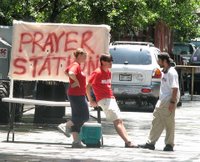Church Study (Elim International Family Church)
Elim International Family Church is what I’ll call a worship centered church, whereby the main focus of the church is the Sunday morning worship service. This is not to say it a large production, it isn’t or hasn’t seemed to be. Granted, the pastor has been away for a month, enrolling his children in University, so we have yet to meet him. It has been a lay-lead church.
Worship
On Sunday mornings, just over 200 people attend its one 10am worship service in a borrowed conference center. The room is well air conditioned, by Ghanaian standards. The youth and some adults teach a concurrent Sunday school class and the 1-5 year olds stay in worship for the first 40 minutes until they are brought forward and prayed for. Then they leave to go to Children’s Church. The worship service continues, mostly populated by adults. The order is as follows
30 minutes of Gathering Music – piano, Lead Worshipper, and back-up singers. Back-up singers stand at the stage left of the congregation and face the Lead Worshipper. So they are not on display, and could be thought of as part of the congregation, but with microphones.
Welcome & Witness – Host tells a story, or invites someone to tell a story of where they saw God in action this week. eg. Angels with grease on their fingers.
* First-time visitors are asked to stand (where they are handed a registration form to fill out and return in the offering sack)
* Long-time absent regulars stand so to be recognized.
* Time of Welcome, where by people go around and shake hands with each other.
Special (optional) Music, Interpretative signing, …
Blessing of the children – Children, age five and under are asked to come forward and be prayed for before leaving for Children’s Church.
Introduction of speaker – with possible unrelated scripture reading.
Message (30 minutes)
Post message prayers. This is a unique time for people who were touched by the message to come forward and be prayed for by the speaker. If less than 10, the speaker will pray and lay hands on them, if larger, then a ministry team joins speaker to pray and lay hands on them at the front of the church. During this time, the music team may sing a song from the Gathering Music set, or a new song. There are no words displayed on the overhead.
Offering People stand for the offering as a bag on a stick is passed around and when collected, brought forth and placed on a table to the stage right of the lecturn (which as far as I can see is not used for anything else). During the collection of the offering, people stand and sing a song from the gathering music set.
Announcements
Song of Sending – often a reprise of something from the Gathering Music.
Benediction.
After worship about 75 people stay behind to chat, and talk. The kids connect with each other and make plans for the following week, the adults make lunch plans. It is a little awkward because the same worship space is used by a Chinese church, but they must wait for us to leave first.
There is no dedicated “Sunday School Hour” but during the weeks “Life Groups” meet in people’s homes. Though not well explained in the announcements, I gather these are small groups that meet throughout the week in the city.
Church Structure
Staff – pastor.
Office – in pastor’s home
Leadership – a board of Elders (5). The purpose of this board is to consult with the pastor on big-ticket items, and the general leadership and direction of the church. I gather that most decisions are made by the pastor.
Property/building – none, other than sound reinforcement equipment and an overhead projector.
Congregation Demographics
30% Ghanaian
50% North American/UK (native English speakers) of which half would be missionaries.
20% other (Syria, South Africa, East African, Lebanese)
Reflection
This is not a “normal” church in that 30% are missionaries, meaning they have some theological and leadership training and a call to use these gifts. The church is organized to be an oasis, where English is the primary spoken language, Western culture is followed, and one has the feeling of stepping into a different world, a taste of home. Now the irony is that the church was started as a mission church out of Singapore, some seven years ago and it has become an ExPat church.
Throughout the expat community, Elim is known for the quality of its youth group. In fact I know several families whose children attend Elim, and the parents elsewhere. Some at the local community church where they are stationed, some across town at a more traditional church. The youth in the group are almost all missionary kids who have been here most of their lives. After the worship service, on first Sunday we attended, the youth quickly attached themselves to our kids. Our kids were invited to youth group (Sat. afternoon) invited to go horse back riding (Tues, 1pm), to work at the orphanage (Sat. AM)… They were amazingly welcoming and within a few weeks my kids felt more connected to this church and its youth than any church we have been to.
As a pastor, I have known this was important, but to see it in action, and so well done, made a deep impression on me. Now granted, these are not your typical kids, not from typical families, and not in a typical place. Their parents are missionaries, and the youth see their mission as one to bring in the lost, even if the lost happened to just be new to the area.
Watching this Elim Church function, and the impact it has on people’s lives in this place makes me rethink much of what I was taught about growing a church. Things like the ratio between worship attender and staff (ratio is 100:1); the importance of organized small groups and Sunday School program and its ratio to worshipper attender (ratio is 7:10, small group:worship attender); of the 80% rule (when a room feels full), of multiple services with different music formats (attracting a diverse group); of having a building; and even a weekly bulletin and newsletter. People are pretty much going to do what they are going to do and having all this formal structure to the church program…I’m not sure it gets anyone more involved than they ordinarily would be involved. Thus, I wonder if we have spent significant amounts of time trying to get people to do what they would ordinarily want to do (read: church programs), and likewise spending an enormous amount of time failing to get people to do what they are already disinclined to do. I joke that so much of ministry is marketing and sales, and while I believe in the product, I’m not sure I trust the approach. Donald Miller writes, in an essay “Problems: What I learned on Television” that the “greatest trick of the devil is not to get us into some sort of evil but rather have us wasting time.”[1] And much of ministry feels just like that, marking or wasting time, but then there is the payoff, when you see a life turned around, or a marriage saved and you know that it was all worth it. Sometimes I hear people say “if only one soul has been saved by all of this then it will be a success.” I can’t help but cringe. It is not that I am big into efficiency, but there is such a thing as effectiveness and allocation of resources. Which brings me back to worship, and Elim Church. They understand that worship is the primary function of the church. They understand it to be an oasis from life and how, when done well, will lead us into longing for more, longing for each other, longing for a deeper connection, to God, and other believers. That is the great hope of worship, to satisfy the longing and leave us wanting more, which is why marketing fails so badly. The goal of marketing is to create a dissatisfaction and offer your product as the solution. In the church we often promise more than we can deliver. “This will be a life changing class,” I’ve said and for some it is true, but for most unless they are in crisis, it is just another program competing for their time and resources, and worship shouldn’t be like.
I joke that so much of ministry is marketing and sales, and while I believe in the product, I’m not sure I trust the approach. Donald Miller writes, in an essay “Problems: What I learned on Television” that the “greatest trick of the devil is not to get us into some sort of evil but rather have us wasting time.”[1] And much of ministry feels just like that, marking or wasting time, but then there is the payoff, when you see a life turned around, or a marriage saved and you know that it was all worth it. Sometimes I hear people say “if only one soul has been saved by all of this then it will be a success.” I can’t help but cringe. It is not that I am big into efficiency, but there is such a thing as effectiveness and allocation of resources. Which brings me back to worship, and Elim Church. They understand that worship is the primary function of the church. They understand it to be an oasis from life and how, when done well, will lead us into longing for more, longing for each other, longing for a deeper connection, to God, and other believers. That is the great hope of worship, to satisfy the longing and leave us wanting more, which is why marketing fails so badly. The goal of marketing is to create a dissatisfaction and offer your product as the solution. In the church we often promise more than we can deliver. “This will be a life changing class,” I’ve said and for some it is true, but for most unless they are in crisis, it is just another program competing for their time and resources, and worship shouldn’t be like. Suzanne and I are enrolled in a Marriage Improvement class offered by the same folks in the UK who created ALPHA. It isn’t that we are in crisis, we just understand that it is good to seek help, especially when you don’t need it. The thing I’ve noticed over the years is that very few people who take these Marriage seminars run into trouble later. It is the ones who are not there, or who don’t think they need to be there, who should be. So it is to those whom we market to, the ones you are disinclined to do what would help them out, and most of the time our efforts fail. They fail in either attracting the people who most need what we’re offering, or they fail in delivering the goods. The class isn’t life changing, or doesn’t make a difference, and so the disappointment runs into worship. What if worship was all a church did, and we took enough time (read more than an hour) to do the job well so that people did get connected to God and each other, and longed for more? I know it goes against all the current thinking in the church growth material, but I’ve got to wonder, is it really working all that well?
Suzanne and I are enrolled in a Marriage Improvement class offered by the same folks in the UK who created ALPHA. It isn’t that we are in crisis, we just understand that it is good to seek help, especially when you don’t need it. The thing I’ve noticed over the years is that very few people who take these Marriage seminars run into trouble later. It is the ones who are not there, or who don’t think they need to be there, who should be. So it is to those whom we market to, the ones you are disinclined to do what would help them out, and most of the time our efforts fail. They fail in either attracting the people who most need what we’re offering, or they fail in delivering the goods. The class isn’t life changing, or doesn’t make a difference, and so the disappointment runs into worship. What if worship was all a church did, and we took enough time (read more than an hour) to do the job well so that people did get connected to God and each other, and longed for more? I know it goes against all the current thinking in the church growth material, but I’ve got to wonder, is it really working all that well?
[1] Miller, Donald, Blue Like Jazz, p13


1 Comments:
My name is Felix Daozie. I am
from Wa in the upper West region.l would plead you to come and open your church brench in WA upper West region.l have been following most of your programmes and l recent upper West for you because this is a place where you can still fine many people(pagans) who are not christians.l will support you in every way to open the church if you see the need to do so.
Post a Comment
<< Home